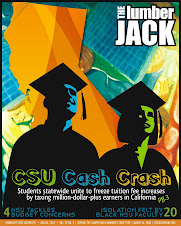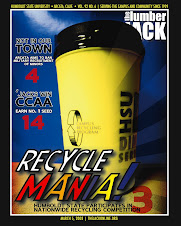
What you did well in this issue:
You produced a number of serious, timely stories on important. There were many stories here that had the potential to be cover stories.
There was also some great art, particularly the center spread for the Gay Pride Parade.
Nice cover, as well.
But there was much room for improvement.
1. Be relevant to your readers
It was good that you covered Rollin Richmond's Q&A session with students, but you took seven paragraphs before you got to the actual questions and his answers. You made the mistake of covering the event as an event. The reader cares most about what Richmond said and what questions from students he evaded.
Keep your language simple and too the point.
My first YIKES! of the term went to this sentence in the story F the Furloughs:
These regressions are the result of mandated furlough days higher educational institutions across the state were required to implement due to the massive state budget deficit.
In other words, just spit it out!
Show don't tell.
Imagine that your reader can't see, so a photo won't do. You must describe what you m
 ean.
ean. - Don't tell us Tony Ramirez is a talented midfielder, show us.
- Don't tell us that many of the participants in the Gay Pride Parade wore colorful costumes. Describe the colorful costumes.
- Don't tell us the audience at the Black Joe Lewis concert danced themselves to exhaustion, describe people dancing to exhaustion.
After your first draft, look for a better lede within the story. It usually hides in the third paragraph from the end or smack in the middle of your piece.
In the story about i
 ntramural sports the lede is that Jan Henry thinks that if you study hard but don't play hard, you only get half an education.
ntramural sports the lede is that Jan Henry thinks that if you study hard but don't play hard, you only get half an education. In Gritty, Not Pretty, it was that if you mix Chuck Berry with Iggy Pop you get Black Joe Lewis.
- In the story about the ROSE center it was that students can get free office supplies.
- In the bloodmobile story, it was that Ben Smith donates more than three quarts of his blood every year.
- In the swine flu story it was that if you share a bong with a friend, the high you get will last you two hours but the flu you might catch will last a week.
 Active verbs power up the story and speed the reader through as story. Passive verbs deflate the story and slow the reader down.
Active verbs power up the story and speed the reader through as story. Passive verbs deflate the story and slow the reader down. Not:
Multiple leagues are provided...
Instead:
The university provides leagues in most sports.
Not:
While students are paying more for their education, they are attending classes less...
Instead:
While students pay more for their education, they attend classes less.
Not:
Among the people who know about it, the program has proved quite popular.
Instead:
People who use the ROSE center love it.
Not:
The intramural sports office is allowing people who are restricted...Instead:
Not:
If you can't enroll in more classes you can pay $2 per team.
If you are interested in joining a team then you should act soon.Instead:
If you want to join a team, act soon.
To make a passive sentence active try and flip it. There is a good chance you wrote the sentence backwards.
Keep quotes sh
 ort
ort Compare:
"Originally, I started playing maybe my freshman, sophomore year when I was actually living in the dorms," he says. " A bunch of my friends wanted to play and I was looking for a sport to play. I played soccer and softball. It was the first time I played softball, ever, and it was a blast. I had a great time doing it."To:
"I started playing maybe my freshman, sophomore year when I was actually living in the dorms," he says. "It was the first time I played softball, ever, and it was a blast."Fish for quotes with personality.

To do that you need to pull anecdotes out of your sources.
In the story about Allison Lawrence, star soccer player, Lawrence says that her dad coached her at age four.
Here are the questions that would pull out the anecdotes:
How did your dad's coaching style compare to that of your current coach? Who was the best coach you ever had and what made him so great?
And ask your source to make a comparison or ask for bests, worsts, firsts, and lasts of something. Those questions force people to think about things that happened to them and pull those memories out of their brains. Spice up a dull story with anecdotes.
Ask for specifics.
Off the field Allison Lawrence enjoys spending time with her friends and family -- who exactly? Best friend Jill Jones? Big sister Jamie who is three years older? Brother Tony who she is really competitive with? Mother who she gardens with?
Ask how and why
If someone says the rock band was killer, ask: "How were they killer?"

If someone says the program is useful, ask: "In what way?"
Or to get a good quote try playing Devil's Advocate.
If someone says that playing intramural sports is fun, you might try saying: "Really? Because I was under the impression that it is really time consuming, what with all that practice and all..."
That prompts the source to say, "No way! There are no practices and when we get together its just a great time. After the stress of classes and tests its a great way to clear your head and blow off steam."
Focus your columns around ONE idea
Column 1: Hector Diaz and students like him: What is it like couch surfing or car sleeping? How many students out there? Who can help him?
Column 2: Rental management companies and how they treat
Column 3: How HSU compares with other schools on providing upper class housing.
Column 4: Arcata's discouragement of student housing
Never accuse without evidence.
You say
 in Deranged that HPM has little to not time to show units to interested students.
in Deranged that HPM has little to not time to show units to interested students.But how do you know that?
So also...
Source all info
It was good that you ran an obituary for Michele Keys, but the information in the article was not sourced. Who said she had an inescapable enthusiasm for adventure?
And in the Foster Farms story, who said that Foster Farms will undoubtedly benefit from the purchasing of the small dairy -- because as a I reader I tend to doubt. And who said that its high end produce is used in many products?
Kill clichés and redudancies

Here's the cliche: One of the remaining flagships of Humboldt County's locally-owned and operated businesses has sailed...
Here's a redundancy: Lewis smiled with satisfaction as he strut about the stage with confidence.
You don't strut with insecurity. Strutting is showing confidence. Don't repeat.

























2 comments:
Thanks for the feedback. I NEED IT!
Ahron wins the steel skin award of the week!
Post a Comment